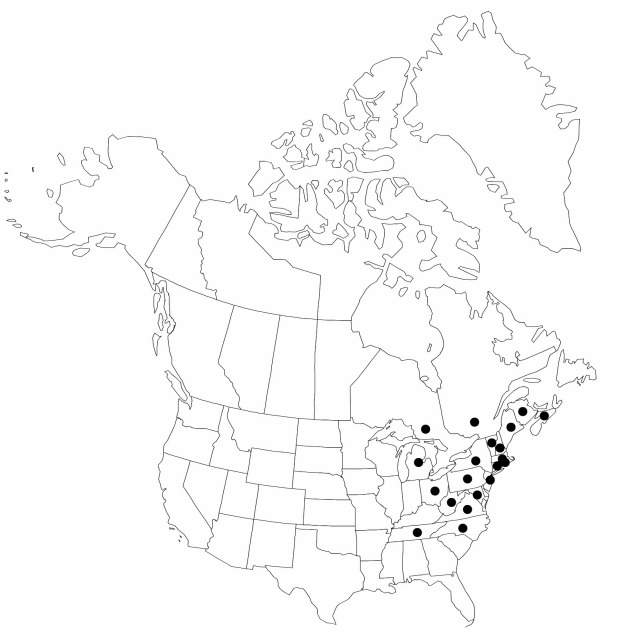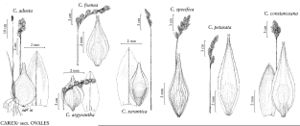Difference between revisions of "Carex argyrantha"
Amer. J. Sci. Arts, ser. 2, 29: 346. 1860.
FNA>Volume Importer |
TammyCharron (talk | contribs) |
||
| (4 intermediate revisions by 2 users not shown) | |||
| Line 1: | Line 1: | ||
{{Treatment/ID | {{Treatment/ID | ||
|accepted_name=Carex argyrantha | |accepted_name=Carex argyrantha | ||
| − | |accepted_authority=Tuckerman | + | |accepted_authority=Tuckerman |
|publications={{Treatment/Publication | |publications={{Treatment/Publication | ||
|title=Amer. J. Sci. Arts, ser. | |title=Amer. J. Sci. Arts, ser. | ||
| Line 8: | Line 8: | ||
}} | }} | ||
|common_names=Silvery-flowered sedge;carex argenté | |common_names=Silvery-flowered sedge;carex argenté | ||
| + | |special_status={{Treatment/ID/Special_status | ||
| + | |code=F | ||
| + | |label=Illustrated | ||
| + | }}{{Treatment/ID/Special_status | ||
| + | |code=E | ||
| + | |label=Endemic | ||
| + | }} | ||
|basionyms= | |basionyms= | ||
|synonyms= | |synonyms= | ||
| Line 32: | Line 39: | ||
-->{{#Taxon: | -->{{#Taxon: | ||
name=Carex argyrantha | name=Carex argyrantha | ||
| − | + | |authority=Tuckerman | |
| − | |authority=Tuckerman | ||
|rank=species | |rank=species | ||
|parent rank=section | |parent rank=section | ||
| Line 46: | Line 52: | ||
|publication title=Amer. J. Sci. Arts, ser. | |publication title=Amer. J. Sci. Arts, ser. | ||
|publication year=1860 | |publication year=1860 | ||
| − | |special status= | + | |special status=Illustrated;Endemic |
| − | |source xml=https:// | + | |source xml=https://bitbucket.org/aafc-mbb/fna-data-curation/src/2e0870ddd59836b60bcf96646a41e87ea5a5943a/coarse_grained_fna_xml/V23/V23_622.xml |
|genus=Carex | |genus=Carex | ||
|section=Carex sect. Ovales | |section=Carex sect. Ovales | ||
Latest revision as of 16:32, 31 January 2022
Plants loosely cespitose. Culms 30–100 cm. Leaves: sheaths papillose, summits U-shaped; distal ligules 3.5–5 mm; blades 4–5 per fertile culm, green, without auricles, 17–37 cm × 2–5 mm, pliable. Inflorescences arching or nodding from proximal spike, open at least proximally, silvery greenish yellow, 2.5–6.5 cm × 7–17 mm; proximal internode 7–18 mm; 2d internode 3–10 mm; often aristate or long-aristate; proximal bracts scalelike. Spikes (3–)7–15, widely spaced except the distal densely aggregated, proximal 1 often stalked, nearly globose or ovoid, 6–17 × 4.5–7 mm, base clavate or attenuate, apex rounded. Pistillate scales silvery pale green with pale or green midstripe, lance-subulate, (3.2–)3.5–4.1(–4.6) mm, shorter and narrower than or equaling perigynia, margin white-hyaline, to 0.6 mm wide, apex acute. Perigynia ascending to spreading, uniformly pale green to straw colored, conspicuously, evenly (4–)5–8(–10)-veined on each face, ovate to obovate, plano-convex, 3–4.5 × 1.9–2.3 mm, 0.6 mm thick, usually widest at 2/5–1/2 total length, margin flat, including wing 0.2–0.6 mm wide, finely granular-papillose; beak whitish at tip, flat, ciliate-serrulate to within 0.3 mm of tip, abaxial suture inconspicuous, distance from beak tip to achene 1.2–2 mm. Achenes oblong-ovate, 1.5–1.75 × 1–1.2 mm, 1.4–1.6 times as long as wide, 0.5 mm thick. 2n = 80.
Phenology: Fruiting mid summer.
Habitat: Dry clearings, open woods, on acidic, rocky, or sandy substrates, rock outcrops
Elevation: 0–700+ m
Distribution

N.B., N.S., Ont., Que., Conn., Maine, Md., Mass., Mich., N.H., N.J., N.Y., N.C., Ohio, Pa., R.I., Tenn., Vt., Va., W.Va.
Discussion
Selected References
None.
